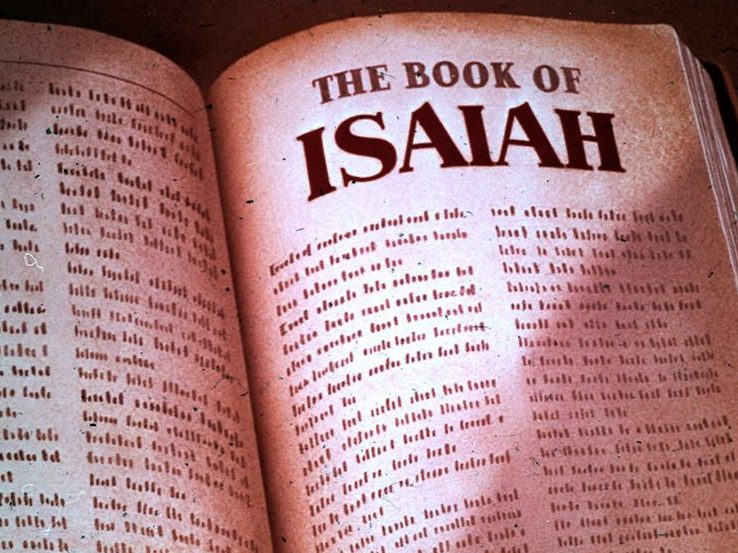
In a recent blog I told you I was working on a project to restore five fragments of an ancient Nazarene Commentary on Isaiah, from five Latin fragments preserved in quotations in Jerome’s Commentary on Isaiah.
Here is the first of the five fragments (On Isaiah 8:14) restored to Hebrew with an English translation:
והיה למקדש ולאבן נגף ולצור מכשול לשני בתי ישראל לפח ולמוקש ליושב ירושלם
פשרו שני הבתים הם בית שמאי ובית הלל מהם ירדו הסופרים והפרושים. עקיבא קיבל את ביתהם. הוא נקרא רבה של עֲקִילַס הגר. ואחריו בא מאיר. אחרי הלל ירשו יוחנן בן זכאי ואחריו אליעזר וטרפון ויוסף הגליל וישוע עד לכיבושה של ירושלים. אז שמאי והלל נולדו ביהודה ובזמן קצר לפני האדון. שמו של הראשון מתפרש שמם. והשני מתפרש חלל. הוא השם וחלל את מצוות התורה ביד גזרתו ומשנה. ואלה שני הבתים שלא קיבלו את המושיע שהפך להם נגף ומכשול.
And He shall be for a sanctuary,
but for a stone of stumbling and for a rock of offense
to both the houses of Yisra’el:
for a gin and for a snare
to the inhabitants of Yerushalayim.
(Isaiah 8:14 HRV)
Its interpretation (pesher):
The two houses are Beit Shamai and Beit Hillel from which the scribes and Pharisees descended. Akiva took over their school, he is called the master of Aquila the proselyte. And after him came Meir. (Hillel having been succeeded by Yochanan Ben Zakkai and after him Eliezer and Tarphon, and Yosef HaGalil and Yeshua up to the capture of Jerusalem.) Shammai then and Hillel were born not long before the Lord; and they originated in Judah. The name of the first means “scatterer” and of the second “profane”, because he scattered and defiled the precepts of the Torah by his decrees and Mishnah. And these are the two houses who did not accept the Savior who has become to them stumbling and offense.
Some restoration/translation notes:
First of all it was necessary to make minor corrections to the list of sages as given by Jerome. Some names were slightly mangled, but easily restored. For example Jerome’s “Telphon” was obviously Tarphon. Also Jerome, not knowing the successions of various Rabbinic sages, mistook the entire list as a straight list of succession. In fact there are effectively two lists here. The first is the line from Akiba to his student Aquila to his student Meir. The second is the line from Yochanan Ben Zakkai to his students and contemporaries (which Jerome mistook as a continuous line).
There is a wordplay in the Hebrew between הלל (Hillel) and חלל (profane) and between שמאי (Shamai) and שמם (scatter). This is similar to the wordplay between Midrash Halacah and דּוֹרְשֵׁי חֲלָקוֹת, doreshei ḥalakot(seekers of smooth things) was used by the Essenes of Qumran in their polemics against the Pharisees.
A word is necessary about the word which I have translated “Mishnah”. In the Latin this appears as “deuterosis” a transliteration of the Greek word δευτερωσεις which has the same literal meaning in Greek as the Hebrew Mishnah (a repetition).
The word “decrees” in the Latin is traditiones which I have rendered in Hebrew with גזרתו literally “decree, sentence, determination, decision”. This is the Hebrew word used in the DuTillet/Munster text of Matthew 15 where Jerome, in his Latin Vulgate uses traditiones.
This text is no intended as an attack on Hillel and Shamai themselves, but on Akiva’s taking over of their school. The commentary seems focused on Akiva. “Akiva took over their school, he is called the master of Aquila the proselyte.” The precepts of the Torah were profaned and scattered by his decrees and Mishnah.
Epiphanius refers to The δευτερώσεις τοῦ καλουμένου Ραββὶ Ακιβά (Mishnah of the one called “Rabbi Akiva”) (Pan. 33:9, 15) and the Mishnah and halachic Midrashim as we have them all descend from the School of Akiva and his taking over of the Houses of Hillel and Shamai.
A good example can be found in Akiba’s גזר (decision) regarding divorce:
The House of Shamai say,
“A man should divorce his wife only because
he has found grounds for it
in unchastity (davar ervah)
, since it is said,
“Because he has found in her
an unclean matter (ervat davar) in anything (Dt. 24:1)”
And the House of Hillel say,
“Even if she spoiled his dish, since it is said,
“Because he has found in her
an unclean matter in anything (Dt. 24:1)”
Rabbi Akiba says,
“Even if he found someone else prettier than she,
since it is said,
“And it shall be if she find no favor in his eyes (Dt. 24:1)”
(m.Gittin 9:10)
Akiva had profaned and scattered the Torah by decreeing that a man could divorce his wife simply because he found a prettier girl.
This work takes hours of my time. As many of you know, my wife is very ill, and I spend most of my time at home as her caretaker. I work at a desk less than six feet from her bed. So I am in a position to dedicate many hours to this important work that I have been directed to do.
But I also realize that it is not the activity of James Trimm alone who is responsible to do this work, it is all of us together who are charged with the responsibility of accomplishing this work. I very much look on the efforts of this restoration work as a cooperative one with each one of you. We are all joint heirs with Messiah and should always be about our Father’s business. I am honored to be able to be partnered with truth seekers as this restoration of Scripture moves forward in fulfillment of prophecy.
Donations can be sent by Paypal to donations@wnae.org.
